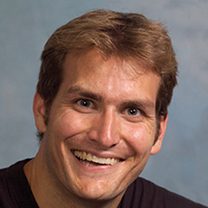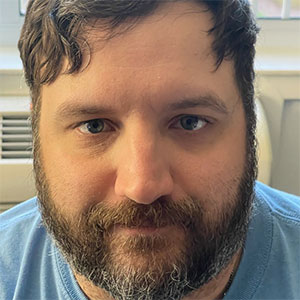Breakthrough lipid-signaling studies earn Burke praise and recognition
John E. Burke, an assistant professor in the department of biochemistry and microbiology at the University of Victoria, has won the Walter A. Shaw Young Investigator Award in Lipid Research from the American Society for Biochemistry and Molecular Biology. The award recognizes his work on the molecular regulation of lipid signaling complexes.

“I am tremendously honored to be awarded the Walt Shaw Young Investigator Award in Lipid Research. I am extremely appreciative to the nominators and ASBMB. This award is only possible due to the work and support of my incredible network of mentors, trainees, and collaborators. ”
— JOHN E. BURKE
“John Burke has been one of the most outstanding graduate students to have studied under my direction for the Ph.D. degree,” former graduate adviser Edward A. Dennis of the University of California, San Diego, wrote in his nominating letter. “I have observed the development of John Burke’s early career and feel that his work up to now suggests a very bright and productive future.”
Burke’s work focuses primarily on the kinases and phosphatases that catalyze the phosphorylation and dephosphorylation of lipid phosphoinositides. Kinases and phosphatases are enzymes that add or remove, respectively, negatively charged phosphate-oxygen groups to other molecules in the cell. This reaction alters the structure of the target molecules, which in turn regulates their function. Burke specifically studies the phosphoinositide 3-kinase and phosphatidylinositol 4-kinase families. These lipid-targeting kinases are under tight regulation, with disruption occurring in many diseases such as cancer, viral infections and inflammation. Accordingly, studying these enzymes could lead to various therapeutics. Indeed, one of Burke’s major contributions to science involves the screening of phosphoinositide kinase inhibitors that may yield potential treatments.
Phosphoinositide kinases are regulated by upstream cell-signaling events. These events occur when specific extracellular molecules bind to receptor proteins in the plasma membrane known as receptor tyrosine kinases and heterotrimeric G-protein-coupled receptors. Virus binding to cognate receptors also can regulate phosphoinositide kinases. Burke’s work has been critical to elucidating these cell-signaling pathways and their dysregulation in disease.
Burke’s research takes an innovative approach by combining several sophisticated biophysical and biochemical techniques, including hydrogen-deuterium exchange mass spectrometry, X-ray crystallography, surface plasmon resonance, isothermal titration calorimetry and functional assays. These techniques enable Burke and his lab to elucidate the structure and function of the lipid-targeting kinases at the cell’s plasma membrane, a complex bilayer of lipids, proteins and carbohydrates that separates the cell’s internal space from the external environment.
Roger Williams, Burke’s postdoctoral adviser in the division of protein and nucleic acid chemistry at the Medical Research Council Laboratory of Molecular Biology, called Burke “simply one of the best postdoctoral researchers with whom I have worked in the 25 years that I have been a group leader in the Laboratory of Molecular Biology in Cambridge, UK. He is an ideal candidate for ASBMB’s Walter A. Shaw Award in Lipid Research.”
Burke earned his Ph.D. in chemistry and biochemistry from the University of California, San Diego, in 2008. He conducted his postdoctoral work with Williams at the Medical Research Council until 2014, after which he was appointed an assistant professor in the department of biochemistry and microbiology at the University of Victoria in British Columbia, Canada.
Burke will receive his award during the 2018 ASBMB Annual Meeting in San Diego, where he will deliver an award lecture on probing the structure, dynamics and regulation of lipid signaling enzymes in disease. The presentation will take place at 10 a.m. April 22 in Room 6F at the San Diego Convention Center.
Enjoy reading ASBMB Today?
Become a member to receive the print edition four times a year and the digital edition monthly.
Learn moreGet the latest from ASBMB Today
Enter your email address, and we’ll send you a weekly email with recent articles, interviews and more.
Latest in People
People highlights or most popular articles

2026 ASBMB election results
Meet the new Council members and Nominating Committee member.

Simcox wins SACNAS mentorship award
She was recognized for her sustained excellence in mentorship and was honored at SACNAS’ 2025 National Conference.

From humble beginnings to unlocking lysosomal secrets
Monther Abu–Remaileh will receive the ASBMB’s 2026 Walter A. Shaw Young Investigator Award in Lipid Research at the ASBMB Annual Meeting, March 7-10 in Washington, D.C.

Chemistry meets biology to thwart parasites
Margaret Phillips will receive the Alice and C. C. Wang Award in Molecular Parasitology at the ASBMB Annual Meeting, March 7-10 in Washington, D.C.

ASBMB announces 2026 JBC/Tabor awardees
The seven awardees are first authors of outstanding papers published in 2025 in the Journal of Biological Chemistry.

Decoding how bacteria flip host’s molecular switches
Kim Orth will receive the Earl and Thressa Stadtman Distinguished Scientists Award at the ASBMB Annual Meeting, March 7–10, just outside of Washington, D.C.

